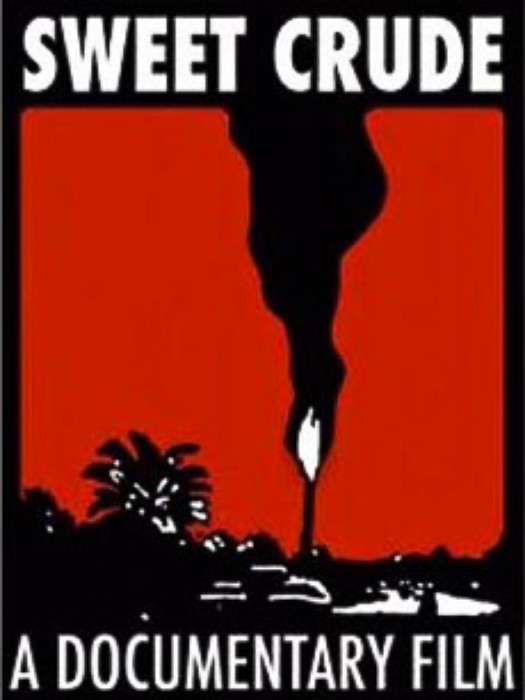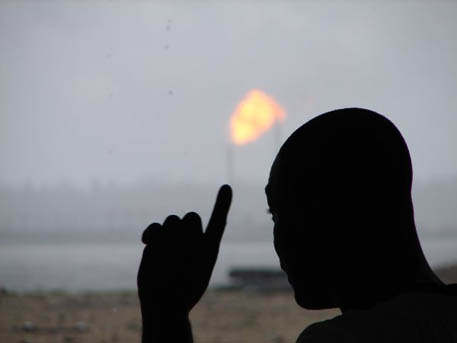Fri 27 Aug 2010
Oil Slick
Posted by Ethan under Film Festivals, Film Review, NYC Film Critic
Comments Off on Oil Slick
Sweet Crude
Directed by Sandy Cioffi
**1/2
Documentary filmmakers always take a risk when they choose to make themselves characters in their movies. Sure the approach has yielded some memorable movies—see Sherman’s March (the granddaddy of all contemporary first-person documentaries), Roger & Me, Stone Reader and Super Size Me.
In all those cases though, the filmmaker was an active participant in (and often the motivating force behind) the story being told onscreen. The same can’t really be said of Sandy Cioffi, who traveled to the Niger Delta region of Nigeria in the mid-2000s to shoot a film about the opening of a new library. Once there, she discovered that the poor residents of this densely populated area were locked in an ongoing struggle with the foreign oil companies (including Chevron, which was also a major player in another recent oil-themed documentary, Crude ) that were pumping profits out of the oil-rich rivers, while paying little attention the environmental and social impact of their presence. Meanwhile, the country’s government routinely sided with the deep-pocketed corporations, even forming a special military branch (called The JTF) to keep the peace through intimidation and violent attacks against those that spoke up in protest.
After her initial trip to the Delta, Cioffi continued to monitor the situation and returned frequently over the course of several years to speak with the members of a resistance group called The Movement for the Emancipation of the Niger Delta (or MEND). Although the group billed itself as a peaceful resistance movement, the international press (particularly the American media) painted them in a far more threatening light, even suggesting that they were linked with Al-Qaeda. And as tensions with the oil companies mounted, violent splinter groups using the MEND name did employ more extreme measures, such as taking hostages and disrupting pipelines. When new elections swept a Delta-born vice-president into office, hopes were high for dramatic change. Sadly, things did not improve and still today MEND struggles to hold peaceful, meaningful talks with Nigeria’s government and the oil companies.
So how exactly does Cioffi fit into these events? Not easily and, to her credit, she does try to keep the bulk of the film’s attention focused on those directly impacted by the situation on the ground. Still, she can’t resist contributing an unnecessary voice-over where she outlines her reasons for making the film and bemoans the lack of worldwide news coverage. It’s all a little too forced, as if she’s trying to justify her presence in the region and her ability to tell this story. (Another odd scene features footage of her posing a question to former Secretary of State Madeline Albright in a public forum—a moment that comes across as out-of-place and vaguely self-aggrandizing.) The movie’s best sequences depict the skewed way that events in Nigeria have been reported by major American news outlets. At one point, Cioffi films a phone conversation between a MEND activist and ABC News reporter Brian Ross where the activist calmly answers Ross’s repeated queries about whether the organization plans any violent protests or receives funds from Al-Qaeda. When ABC finally airs their report, it essentially declares MEND to be a terrorist group and omits the activist’s carefully measured responses altogether. With Sweet Crude, Cioffi does succeed at setting the record straight and exposing viewers to a situation that many of us in America hear very little about. But had she taken a few steps back from the material, the result may have been a stronger film.
Sweet Crude is screening this weekend as part of The African Diaspora Summer Film Series. Visit NYADFF.org or the film’s official website to learn more.




No Responses to “ Oil Slick ”
Sorry, comments for this entry are closed at this time.